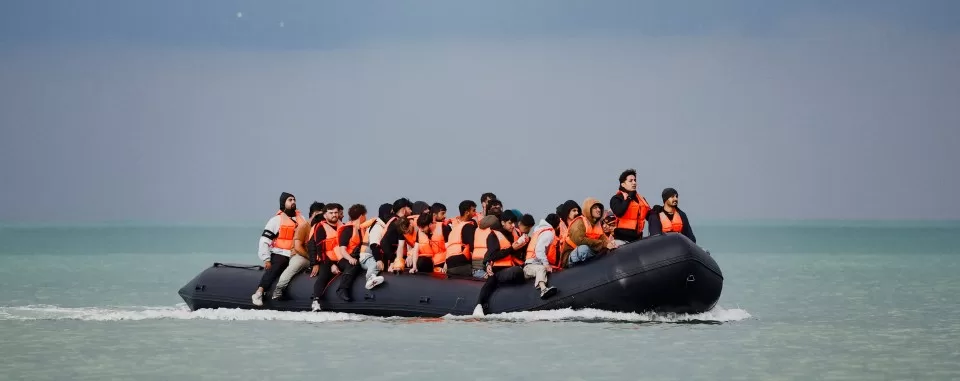FROM the coast of France, desperate migrants are climbing into ever- flimsier vessels, some with floors made of plywood and engines held in place with screws.
They sail into the world’s busiest shipping lane without navigation equipment, in unpredictable weather, wearing life jackets that aren’t fit for purpose.
We saw the deadly consequences of actions like those this week, when 12 people, including a pregnant woman and six children, died after their dinghy capsized in the Channel.
From what I saw when I joined Border Force patrol vessels recently, the migrant boats are hopelessly overcrowded, sitting very low in the water, with some very distressed people on board.
Frankly, I’m amazed we have not seen many more drownings.
Now Labour need to show they have an effective plan to stop the boats.
There are some good ideas coming from the new Home Secretary, Yvette Cooper.
We do need to smash the smuggling gangs. I’ve dealt with them myself in the past. They are the worst of us.
They don’t care about human life. They’re only in it for the money.
By working with European agencies, the last government had already restricted the gangs’ access to inflatable crafts and outboard motors — which is why the current boats are larger and even more overloaded.
More cooperation between different law-enforcement agencies will make it harder for these criminals to operate. Especially if we join forces with EU agencies.
I also applaud the Home Secretary’s plan to create a “returns and enforcement unit”, with 1,000 staff who can swiftly process asylum claims and remove those whose applications are rejected.
I presided over the “detained fast track” system when I was at the UK Border Agency more than a decade ago.
We raised removal rates by quickly identifying cases that did not have a very strong claim to asylum, and by placing case workers and adjudicators in the detention centres to speed up the process.
Eventually, after I retired, the process was discontinued on legal grounds because opponents argued in court that it was not thorough enough due to the time constraints.
But by simplifying the guidance to speed up the process — without denying anyone a fair hearing — it could work again in many cases.
Also, following a 2016 report, the number of detention beds available for immigration enforcement decreased under the previous government from some 4,000 to about 2,300.
Labour plans to add more places, but our prisons are full and much of the Estate is now occupied by foreign-born prisoners awaiting deportation.
While we can persuade some people to leave voluntarily when their claims are refused, many do not — and instead they abscond into the community.
We will need many more detention places to raise the removals rate to the levels we saw ten years ago which, hopefully, will deter others from crossing.
However, I fear there is still a hole in the plan.
There is still a very significant supply of migrants in the EU who would come here if they could.
Enforcement decreased
And for every smuggling gang that is smashed, there is another waiting in the wings — because the financial rewards are huge.
What Labour needs is a significant deterrent to asylum seekers who are thinking of making that deadly journey to the UK.
Speeding up processing and removing more claimants will help — but that will only work for some of the nationalities.
People originating from places such as Syria, Afghanistan and Iran have a very good chance of qualifying for asylum if they can get across the Channel — and even those that don’t qualify are very hard to remove.
So if France won’t take them back and we can’t send them home, then where will they go?
Although the last government’s Rwanda scheme was imperfect, at least it provided an answer to this question.
The treaty with Rwanda enabled us to send asylum seekers there for processing, with a guarantee that none would be sent home regardless of the outcome of their asylum claim.
They would be welcomed in Kigali and could set up a new life there — as have many other refugees from neighbouring countries.
That move to axe the Rwanda option is looking even more rash this week following news that the German government was considering sending illegal migrants to the same facilities in Rwanda paid for by British taxpayers.
However their plan is apparently to simply “offshore” the decision-making and to allow successful applicants to return to Germany.
Many EU countries, such as Germany, France and Italy, are facing voter dissatisfaction over rising immigration.
We’ve seen Italy impounding the charity boats that are picking up migrants in the Mediterranean; the Greek government sending people back to Turkey; and now even Germany is considering off- shoring its asylum process.
Death-trap dinghies
Migrant crossings into the EU are down nearly 40 per cent so far this year, while outbound crossings and attempted crossings to the UK are up 22 per cent.
It was the Rwanda threat, in my opinion, which would have made migrants think twice about getting into one of those death-trap dinghies.
It was a viable deterrent for those “hard to remove” nationalities.
And there was some evidence in Calais to indicate the plan might have worked.
But now we will never know if it would have been an effective deterrent, because it has been scrapped.
So, as things stand, many migrants in Calais will still think that if they reach Britain’s shores, they will be able to stay here, no matter what.
While that remains the case, I fear they will just keep coming – and, sadly, more will drown.



